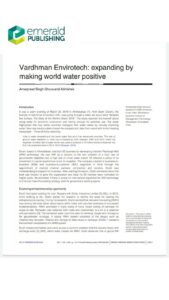The teaching case on Vardhman Envirotech is now published by Emerald Emerging Market case study. 
https://www.emerald.com/insight/content/doi/10.1108/EEMCS-05-2021-0164/full/html
Vardhman Envirotech: expanding by making world water positive
Amarpreet Singh Ghura and Abhishek,
Introduction
It was a warm evening of March 25, 2019 in Ahmedabad [1]. Amit Doshi (Doshi), the founder of Vardhman Envirotech (VE), was going through a water aid study titled “Beneath the Surface: The State of the World’s Water 2019.” The study reported the tradeoff about using water for economic production and having enough for personal use. The study highlighted that how some countries managed their water needs by virtually importing water. Next day media outlets shared the snippets and data from report with India’s leading newspaper – Times of India, reporting:
India is water stressed and has lower water foot print than advanced countries. The rate of ground water depletion in India has increased by 23% between 2000 and 2010. India has exported 10 trillion liter of water which was used to produce 3.72 million tonnes of basmati rice that India exported alone in 2014–2015 (Dhawan, 2019).
Doshi, based in Ahmedabad, had built VE business by developing Injection Recharge Well (IRW) technology. He saw IRW as a solution to the twin problem of a high rate of groundwater depletion and a high rate of virtual water export. VE followed a policy of no investment in capital expenditure since its inception. The company catered to business-tobusiness (B2B) and business-to-customer (B2C) segments in India through the appointment of multiple channel partners, contractors and vendors. Doshi was contemplating to expand his business. After reading the report, Doshi wondered about the best way forward to grow the organization and keep his 20 member team motivated for higher goals. He wondered if there is scope for international expansion for IRW technology or if he can make the existing strategy work for government sector projects.
